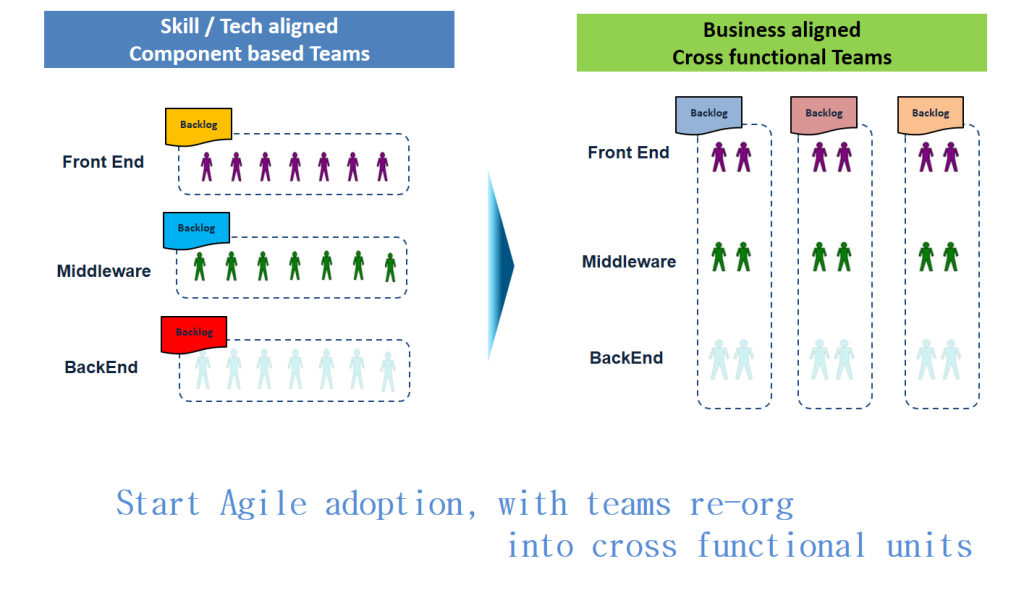Get yourself ready for scaling your Agile Knowledge - Get in touch with us for Fantastic training by Industry-leading trainers
From Agile Teams to PODs
“In place of allocating people to project, allocate project to team”. This paradigm shift in approach is being advice and advocated by agile experts for all good reasons.
Many companies are adopting this approach; I personally have been part of team working on this approach in a multinational company. We adopted it well in our sub-function. Here is my learning (based on failure and success) on how we did it and challenges
Idea here is to form full stake teams, allocate them project, when project ends, don’t dismantle team, rather maintain them (as you maintain people on bench) and then allocate new project to same team.
This shift is difficult but also essential. It’s difficult to get away from traditional approach of team formation based on project need; new approach suggest to form teams (cross functional self sufficient) upfront and then allocates any project to them. We prefer to call them Pod.
Most asked question by both internal stakeholders as well as customer is “what full form of Pod is?” Well, here Pod is not an abbreviation; in current context it’s about completion in itself (like iPod), it’s a complete unit capable of doing-all-that-needs for a successful project delivery.
Why Pod –
- Speed – Team formation takes its own time; often it takes 6 – 12 weeks, to form a team and make then productive. From team to Pod approach, enable one to shorten this time period significantly, that resulting into huge lag up and speed to overall delivery.
- Fast changing technologies / tools – now companies and professional are not only coping with ever changing business requirements, but also fast and regular changes in technology stack & tool sets. So forming teams based on people expertise on certain skill may soon become redundant; Need of hour is forming cross functional team (Pod) able to fast adapt to changes.
- Best suited for Agile – Agile delivery is a team sport; to win in any team game, need to think & plan everything from team standpoint and avoid counting on individual contribution. Pod culture enables organization to approach every decision from team perspective.
- Scaling and de-scaling is new normal – fast ramp up and ramp down is more frequent now, growing popularity of scaling frameworks are testimony o this fact. Pod culture enables scaling / de-scaling with an ease.

Challenges and what it takes to overcome them – biggest challenge here is complete shift from traditional people management, now it’s no longer people management, its team (pod) management, be it staffing, bench, trainer or appraisal.
- Change in staffing approach – allocate team not individual
- Bench management – from people on bench to pods-on-bench Or Standby Pods
- Appraisal system need to pivot accordingly – focus from individual performance to team performance and reward to teams
- Change in training approach / content – focus shift from competency building of individual to workshop led training programs to build team’s competency on required skills and impart culture & mindset to happily and quickly adopt changes in technology, tools and engineering practices.
How we did it – In my organization – we practice following
- Maintain standby Pods (something like team on bench) – by form Pods (cross functional full stake team) – based on work projection (demand)
- Pods undergo “Pod readiness workshop” – a especially designed training cum workshop to impart all required skills and culture / mindset
- Allocate project to Pod
- When current project ends, allocate them new project – don’t change team composition (until someone left the organization or organization have to let someone go). Let’s team learn and adjust to project context (from skill set and approach standpoint) and adopt
- A shared Pod (team of subject matter experts like Agile coach, DevOps expert, Architecture and tool experts etc.) supports all pods to adopt best engineering practices as well as new technolog, tool, approach etc.
- In case of no project or project in waiting stage, treat Pods as stand by pods and utilize time in competency building and POCs
From my experience and out customer experience (satisfaction) I can happily claim that we did it right (including countless fast failures, experiment and pivots) and now we are getting good result. Adoption to “Allocate project to team Or Pod culture” is worth every penny spend.
Next article to Read –
Bot inside Pod – Future on software development: In next article, I will explain our experiment on adding a bot in the Pod, and we are not the only one; this is soon be a new normal.





